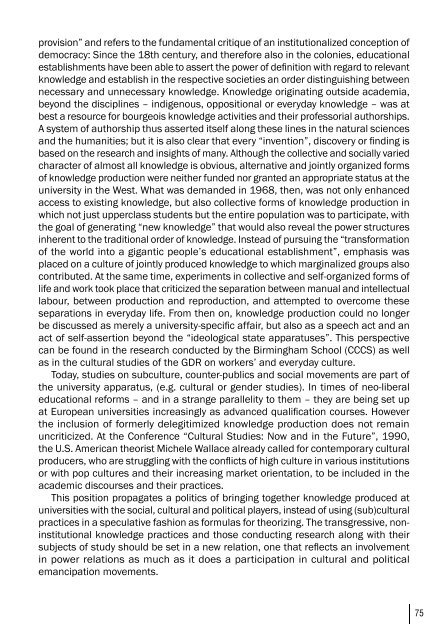art-e-conomy _ reader - marko stamenkovic
art-e-conomy _ reader - marko stamenkovic
art-e-conomy _ reader - marko stamenkovic
You also want an ePaper? Increase the reach of your titles
YUMPU automatically turns print PDFs into web optimized ePapers that Google loves.
provision” and refers to the fundamental critique of an institutionalized conception of<br />
democracy: Since the 18th century, and therefore also in the colonies, educational<br />
establishments have been able to assert the power of definition with regard to relevant<br />
knowledge and establish in the respective societies an order distinguishing between<br />
necessary and unnecessary knowledge. Knowledge originating outside academia,<br />
beyond the disciplines – indigenous, oppositional or everyday knowledge – was at<br />
best a resource for bourgeois knowledge activities and their professorial authorships.<br />
A system of authorship thus asserted itself along these lines in the natural sciences<br />
and the humanities; but it is also clear that every “invention”, discovery or finding is<br />
based on the research and insights of many. Although the collective and socially varied<br />
character of almost all knowledge is obvious, alternative and jointly organized forms<br />
of knowledge production were neither funded nor granted an appropriate status at the<br />
university in the West. What was demanded in 1968, then, was not only enhanced<br />
access to existing knowledge, but also collective forms of knowledge production in<br />
which not just upperclass students but the entire population was to p<strong>art</strong>icipate, with<br />
the goal of generating “new knowledge” that would also reveal the power structures<br />
inherent to the traditional order of knowledge. Instead of pursuing the “transformation<br />
of the world into a gigantic people’s educational establishment”, emphasis was<br />
placed on a culture of jointly produced knowledge to which marginalized groups also<br />
contributed. At the same time, experiments in collective and self-organized forms of<br />
life and work took place that criticized the separation between manual and intellectual<br />
labour, between production and reproduction, and attempted to overcome these<br />
separations in everyday life. From then on, knowledge production could no longer<br />
be discussed as merely a university-specific affair, but also as a speech act and an<br />
act of self-assertion beyond the “ideological state apparatuses”. This perspective<br />
can be found in the research conducted by the Birmingham School (CCCS) as well<br />
as in the cultural studies of the GDR on workers’ and everyday culture.<br />
Today, studies on subculture, counter-publics and social movements are p<strong>art</strong> of<br />
the university apparatus, (e.g. cultural or gender studies). In times of neo-liberal<br />
educational reforms – and in a strange parallelity to them – they are being set up<br />
at European universities increasingly as advanced qualification courses. However<br />
the inclusion of formerly delegitimized knowledge production does not remain<br />
uncriticized. At the Conference “Cultural Studies: Now and in the Future”, 1990,<br />
the U.S. American theorist Michele Wallace already called for contemporary cultural<br />
producers, who are struggling with the conflicts of high culture in various institutions<br />
or with pop cultures and their increasing market orientation, to be included in the<br />
academic discourses and their practices.<br />
This position propagates a politics of bringing together knowledge produced at<br />
universities with the social, cultural and political players, instead of using (sub)cultural<br />
practices in a speculative fashion as formulas for theorizing. The transgressive, noninstitutional<br />
knowledge practices and those conducting research along with their<br />
subjects of study should be set in a new relation, one that reflects an involvement<br />
in power relations as much as it does a p<strong>art</strong>icipation in cultural and political<br />
emancipation movements.<br />
75


